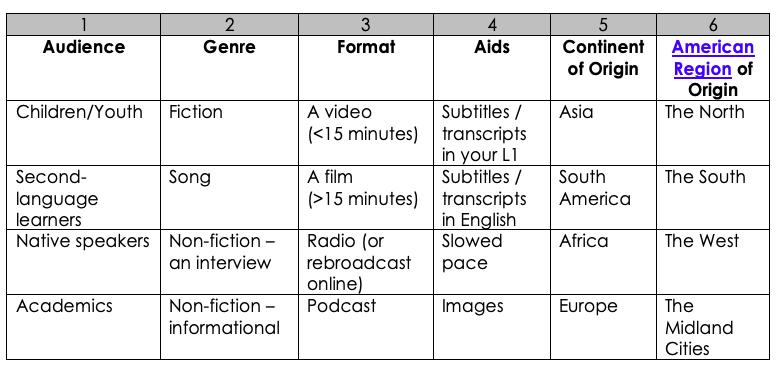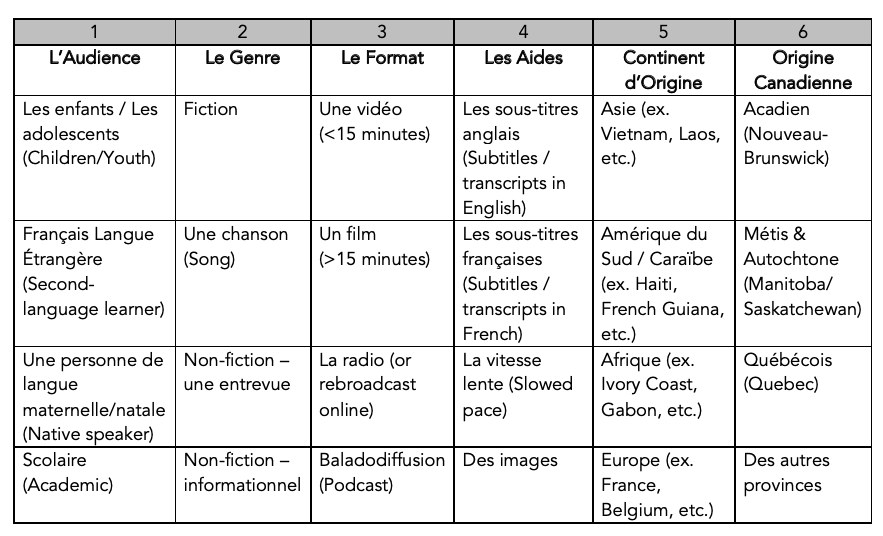Your language-teaching mission, should you choose to accept it, is to encourage students to explore a variety of listening sources, create a database of reviews, and/or have students reflect metacognitively on their listening skills.
Image source: https://www.nytimes.com/guides/smarterliving/be-a-better-listener
Feel free to scroll to the bottom to get right to downloading this resource available in English or English/French.
There are plenty of reasons why giving students free choice in their reading is best for having them (gasp) actually enjoy reading! There are also some great ideas out there for building up reading programs that make students love reading again (my interview with Agent Kari Pitstick about reaching reluctant readers was very inspiring in this regard!) However, it got me thinking… we do a lot to encourage students to explore written resources for pleasure, why aren’t we doing the same for listening resources?
When looking at the learning outcomes for my second language courses, I found that students should be able to ‘independently locate, explore and think critically about a wide variety of texts’ and ‘recognize different purposes, degrees of formality, and cultural points of view in these texts’. Often, we view ‘texts’ as being only written, but they can be listened to as well! Therefore, this project is designed to encourage students to explore and evaluate a variety of listening resources. Additionally, it is designed to dovetail with the research component of their Genius Hour projects. However, if you aren’t doing a Genius Hour project, I also have a version where they explore a topic of interest to them (i.e., sports, celebrities, fairy tales, cars, video games, etc.)
After listening to Kari, I have to admit I’m a convert for not making students do a lot of onerous work around what they are reading (or in this case, listening to). HOWEVER, this project is designed more around metacognition and sharing, rather than deep analysis of the actual text.
Part one of the assignment is a Listening Resource Portfolio that can be shared with other classes. The idea is that, as a department or group of classes, you can build up a list of resources on a variety of subjects with which students can use to practice their listening skills. So, if you are doing some free listening practice and students say “but I don’t know what I want to listen to” you can point them to the resource collection, and they can browse for a topic or type of resource that interests them. This would be perfect for building up a giant google slide deck or other similar online resource that students could access at home!
I’ve created a chart of possibilities for students to choose from for exploring resources to encourage them to go outside of their confort zones (below - English on the right, French on the left). In the project I have students choose from these categories, and I also think it’s a great way to demonstrate the global nature of language!
If all you’re looking to do is get students to gather resources to share, then you can stop here! The evaluation for part one is pass/fail: did the student fulfill the criteria or not?
Part two of the assignment is a Personal Reflection, which I tell my students will not be shared. It is designed so that students can demonstrate their ability to reflect metacognitively (thinking about their thinking) about their listening experiences. There is a part for reflecting on the content itself (in a general way) and a part for reflecting on their listening skills. Because I speak the same L1 as my students, I have them do this part in our shared language of English because I want to emphasize that it’s about the thinking that they are expressing, not about language proficiency. However, I understand that not everyone follows this line of thinking, or shares the same languages as their students.
I think it’s important to note that being a good listener is not an innate skill. Like anything else, it needs to be explained and practiced. I like to use the six strategies of inferencing, elaboration, self-monitoring, summarization, self-evaluation, and toleration of uncertainty. You can download a handout developed by pbworks based on research by Young (1997) here that I like to use.
RESOURCE: Listening Project (in English with English examples, can be adapted to other languages, stands alone as a project)
RESOURCE: Listening Project (in English with English examples, can be adapted to other languages, has a connection to a genius hour project)
RESOURCE: Listening Project (instructions in English for French students, examples in French, stands alone as a project)
RESOURCE: Listening Project (instructions in English for French students, examples in French, has a connection to a genius hour project)
RESOURCE: Listening Project Evaluation (in English/French)
RESOURCE: Listening Project Evaluation (English only)
How do you engage students in listening? Feel free to share in the comments!



















